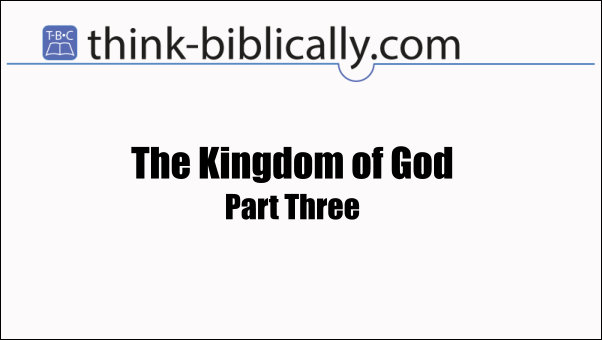By Tyson Thorne

As Christians we often wonder, "How would Jesus vote?" Theologically speaking, this is the wrong question. Jesus wouldn't vote because he is the King. That is not to say that we shouldn't vote, or be involved in politics. Indeed, it is part of our responsibility as ambassadors for the kingdom to work in whatever way we can to instill in our societies the values of God. There is great benefit to this. In doing so, however, we must keep Jesus in proper perspective, and our own place in his Kingdom and in earthly kingdoms in a right view.
The question we should be asking is, "How would Jesus have me vote?" To answer this question, let's start with the generic, top level and work our way down to more specific, local government. In doing so, we recognize that every country will have it's own struggles in figuring this out. Some countries don't even allow elections, so the idea of voting isn't an option. For such people, understanding these issues will still help them to devise plans to improve their own country's situation. Therefore, while we'll be looking at America's system in particular (because that is the one I'm most familiar with) these principles of citizen politics should help anyone under various forms of government.
In Ephesians chapter two Paul tells us that in Christ there is no longer Greek or Roman, Jew or Gentile, or slave or freeman. The only distinction we are to make in this world is who belongs to Christ and who does not. What does this mean in politics? It means that identity politics is dead. We do not vote for people because of their race or gender. If possible, we elect Christians knowing that they (likely) be more fair, more moral and more willing to extend freedom to all. This is not always possible, in which case we vote according to our Christian conscience for the person we believe will do the greatest good. Even non-Christian peoples can do good things, they just cannot be "good people" by God's definition.
Jesus said, "For you will always have the poor with you," (Matthew 26.11a). How a country attempts to help the poor is important. In Israel, God's plan for the poor didn't involve a government program opting instead for citizens to assist the poor in their lands: "There will always be poor people in the land. Therefore I command you to be openhanded toward your fellow Israelites who are poor and needy in your land." When people help other people there is accountability in the transaction, and usually work was involved as well (see the practice of gleaning as an example).
If the poor are first the responsibility of the people, what role can government play in helping? There are two practices that come immediately to mind, and I'm sure there are others. The first is to offer tax breaks for citizen groups that help the poor. Our country has old and healthy non-profit groups that enjoy tax-free status, like the Salvation Army and homeless shelters. The government offers citizens tax breaks when they donate to such non-government organizations. This is all good. The second method is to create an economy that offers people a way out of poverty. I'm not talking about income equality, which stifles the biggest achievers in a society. Rather, economic mobility provides far greater success. An economy that allows people to move from poor to middle- or upper-class and allows the upper-class to take risks that may land them in the poor house is a far better system for everyone. While this does not address those with physical or psychological problems that keep them from working, it does address the majority of the impoverished. Other citizen run groups can assist those incapable of working a regular job.
During his first advent, Jesus spoke infrequently about government. He did validate their right to exact taxes and to have a military, but otherwise he remained silent. This is because he didn't come to fix or overthrow governments; he came to save people from the penalty of their sins. Because all have sinned, and because all people are sinful, all need to accept Jesus to be sure. How this relates to government, however, is another matter. Because all people are sinners, the best governments are limited in scope and power. America's founding fathers understood this and believed that government best serves its people when it remains small and only accepts power to act when it is either at the people's request or to secure the nation through just law and law enforcement. These concepts are as true for national governments as it is for state and city governments — and even Home Owner's Associations (which are a form of local government).
There is so much more that could be said, but these few principles will inform the Christ-minded voter and help them determine how God would have them vote. If you have comments about this article, or other observations, please find the Think-Biblically group on Facebook and sound off.
